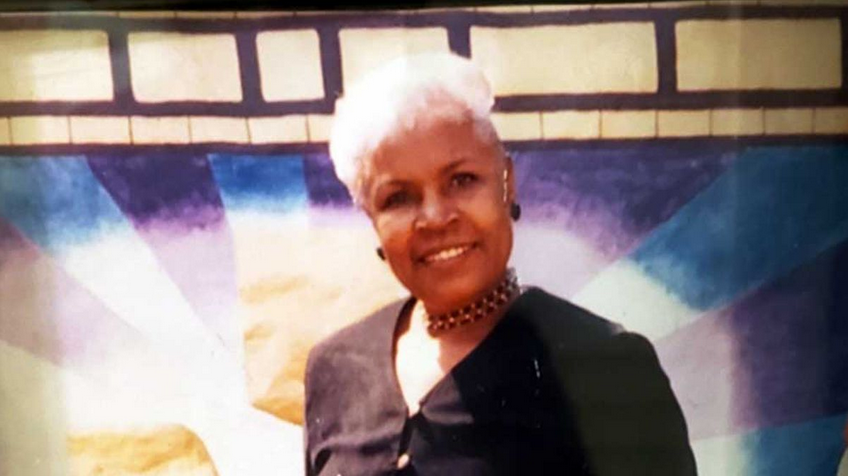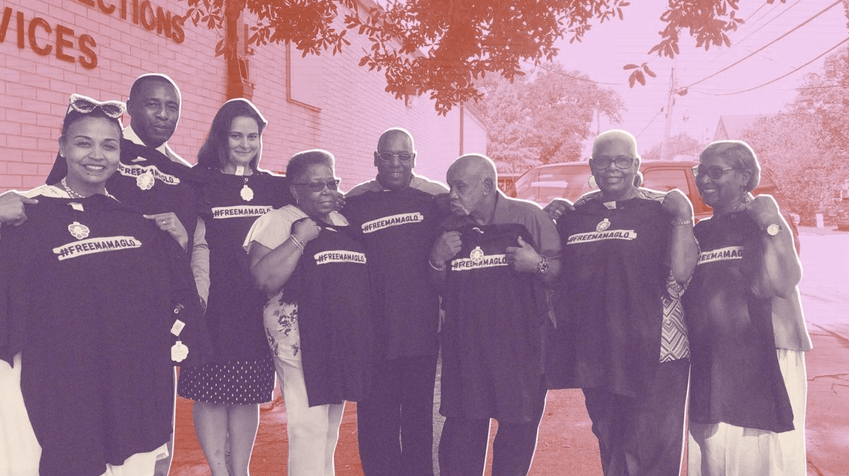By Admin
•
24 Apr, 2020
Gloria Williams’s approved clemency application has been waiting for the governor’s signature for nine months. Gloria Williams has been in prison for nearly 50 years. In 1971, she and several others robbed a grocery store with a toy gun; after a struggle with the store owner, who was armed, someone in her group shot the owner with his own gun. She was 25 years old, the mother of five kids, and sentenced to prison for the rest of her life. She is currently Louisiana’s longest-serving incarcerated woman. At the Louisiana Correctional Institute for Women, Williams has become a mentor for the younger women there, who affectionately call her “Mama Glo.” She has also been a member of the prison’s drama club for two decades. “Everyone knew and loved Mama Glo and really called on her as the matriarch of the prison,” said Fox Rich, who served time alongside Williams and is now a criminal justice advocate. Last year, Williams’s large family worked tirelessly to help her put together a clemency application, which, if approved, would allow her to go free. About 30 members of her family traveled to her clemency hearing in July, mostly from Houston and Beaumont, Texas, to tell the judge in person the things they included in letters to the Louisiana Board of Pardons — her hard work to change herself over the years from a domestic abuse survivor who “took a wrong turn” in life, as her sister Mary Smith-Moore put it, into a woman others looked up to and relied on. The Board of Pardons unanimously approved her clemency application that same month. “I spoke at her clemency hearing,” Smith-Moore said. “The experience was indeed positive, and we were grateful that they heard us — they read our letters, and they recognized all the efforts she put in to become a different version of who she was.” Williams got to meet her grandchildren for the first time at the hearing. The mood was bright — like a family reunion, fitting in the big missing piece — and Williams began to plan for her return. Instead, the clemency application has sat on the desk of Louisiana’s governor, John Bel Edwards, for nine months waiting for his signature. “They said, ‘Wait till the election.’ We had family friends out in droves voting for this person because supposedly he was going to grant her petition,” Smith-Moore said. “And then there was a runoff, and ‘Wait till the runoff.’ And it still hasn’t happened. When the coronavirus outbreak started reaching the US … we have been on pins and needles.” Over the weekend, Smith-Moore and the rest of Williams’s family finally got news — but it wasn’t about her release. They were told through Rich, who helped them work on Williams’s clemency application, that Mama Glo was hospitalized in critical condition and having trouble breathing. Days later, Williams’s attorney was able to confirm that she tested positive for Covid-19 and was receiving oxygen and antibiotics to fight pneumonia in both her lungs. “We are just devastated,” Smith-Moore said. “We’ve been calling, leaving voicemails at the governor’s office, getting no answer. Asking him to takea look at this and get her out of there because of her age, and what is she gonna do at her age? She’s not a danger to society or to anyone. And she’s at the most vulnerable age [for serious complications from Covid-19]. It’s just inhumane almost, really.” Jails and prisons are in crisis around the country Prisons and jails are hotbeds for the spread of Covid-19 due to the number of people in tight quarters, inaccessible cleaning and grooming supplies, lack of adequate medical care, visits from the outside population, and a staff that enters and leaves each day — all potential factors leading to the rapid spread of this disease. On top of that, prison and jail populations experience preexisting conditions that leave them particularly vulnerable to Covid-19 — including heart problems, high blood pressure, tuberculosis, and asthma — at a much greater rate than the general population. Thousands of incarcerated people and corrections staff have been stricken with the disease. As of April 22, New York state reported 844 staff, 239 incarcerated people, and 35 parolees had tested positive for Covid-19; 12 have died. At Rikers Island in New York City, 93 of every 1,000 inmates have tested positive as of April 21; in the rest of the city’s population, that number is 16 of every 1,000. In Ohio, 2,011 incarcerated people at the Marion Correctional Institution, more than three-quarters of its population, have tested positive for the virus as of April 22; one has reportedly died. Among staff, 154 have tested positive and another has died. In Cook County Jail in Chicago, nearly 400 incarcerated people have tested positive for Covid-19, and six have died as of April 21. As these outbreaks continue and intensify, public health officials, advocates, and some district attorneys and sheriffs have called for thinning out jail and prison populations. “This is a public health crisis that threatens to become a humanitarian disaster,” warned the Brooklyn DA, the former health commissioner, and the president of the Ford Foundation in a New York Times op-ed late last month. Many advocates say the officials who have the power to release people in prisons and jails are generally moving too slow and releasing too few to mitigate the spread of the disease. In Texas, an attempt to reduce the number of people in the Harris County Jail in Houston was met with a state-level resistance from Governor Greg Abbott; in the meantime, at least 151 jail staff and 99 incarcerated people have tested positive for Covid-19. Governors have a range of tools to help toward this aim, including granting clemency, giving more credit for time served, and temporarily furloughing prison populations. In some states, governors are using those powers fairly aggressively: California’s governor, Gavin Newsom, ordered the early release of 3,500 people from prisons over the next two months. Iowa has released 811 people from prison since March 1 and recently announced releasing 482 more. But New York Governor Andrew Cuomo said he had no plans to release anyone early from the state’s prisons, although he announced that 1,100 people across the state “may be released” with community supervision. In Louisiana, the governor is not going far enough to help ease the Covid-19 cases among the incarcerated In early February, the Advocate reported that Louisiana Governor John Bel Edwards commuted the sentences of 34 incarcerated people since taking office in 2016, an increase from former Governor Bobby Jindal’s three individual sentence commutations over the course of his two terms in office. But Edwards’s number is still only 16 percent of the more than 200 approved clemency applications he’s been given from the Louisiana Board of Pardons and Parole. In mid-April, the Louisiana Department of Corrections announced its plan to review about 1,000 prisoners who are scheduled for release in the next six months over whether to give them a temporary medical release during the crisis — a plan advocates say does not go nearly far enough. “Subjecting people who are already within six months of their release date to a cumbersome, one-sided review process does not go nearly far enough to avert a prison pandemic that would disproportionately impact people of color and further strain our health care system,” Alanah Odoms Hebert, executive director of the Louisiana ACLU, told the Advocate. “We urge Governor Edwards to heed the advice of public health experts and use his executive power to reduce our prison population — before it’s too late.”"“THIS IS A PUBLIC HEALTH CRISIS THAT THREATENS TO BECOME A HUMANITARIAN DISASTER”" Williams’s lawyer, Mercedes Montagnes, said that instead of fighting for her life in the hospital, Williams should be home right now with her family. Montagnes said that despite the months going by after her clemency application was approved by the board, Williams never lost hope for that reunion. “Gloria is a compassionate and thoughtful woman. She’s a religious woman, and she’s very patient,” Montagnes said. “She has a huge, vibrant, loving family. She was just so eager to get home to them.” Now that she’s in the hospital, Montagnes said her family is unable to reach her even by phone. “One of the reasons we’re asking the governor to grant clemency immediately is so that her family could have access to her in the ways that others could have access to their family members,” she said. “The humanity of our clients and the people we serve is real, and the current system is not treating incarcerated people as humans.” Smith-Moore said the family has started a phone chain, each giving each other pieces of news and trying to lift each other’s spirits. They’re praying for Gloria to come home. “God hears prayers. I believe that with all of my heart,” Smith-Moore said. Still, she and her family are terrified for her sister and frustrated that she isn’t home safe with them in the midst of this crisis. “This is senseless for her to be in this predicament,” Smith-Moore said. And about the governor, “I don’t know what’s so important that you got all these people in your office that you can’t take a look at a paper. I just don’t get it, I don’t understand it.” Support Vox’s explanatory journalism Every day at Vox, we aim to answer your most important questions and provide you, and our audience around the world, with information that has the power to save lives. Our mission has never been more vital than it is in this moment: to empower you through understanding. Vox’s work is reaching more people than ever, but our distinctive brand of explanatory journalism takes resources — particularly during a pandemic and an economic downturn. Your financial contribution will not constitute a donation, but it will enable our staff to continue to offer free articles, videos, and podcasts at the quality and volume that this moment requires. Please consider making a contribution to Vox today.







